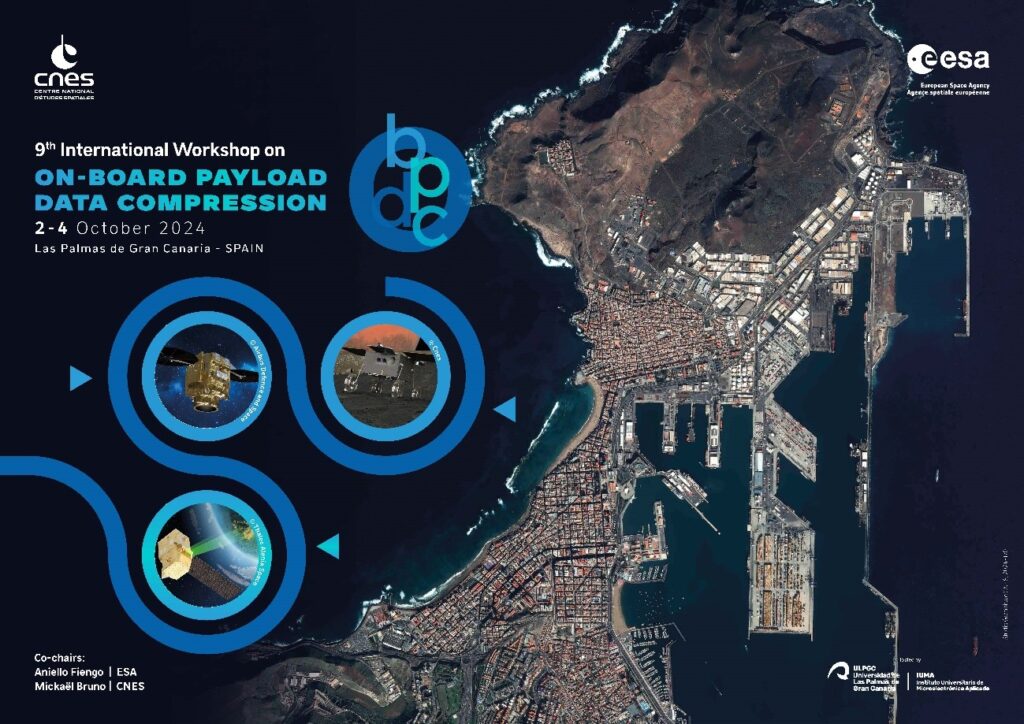ESA, CNES and IUMA organise congress on satellite data compression in Gran Canaria
Las Palmas de Gran Canaria will host, from 2 to 4 October 2024, the ninth edition of the International Congress On-Board Payload Data Compression (OBPDC) organised by the European Space Agency, the French National Centre for Space Studies (CNES) and the Universidad de Las Palmas de Gran Canaria , The Institute for Applied Microelectronics (IUMA) and specifically the Integrated Systems Design (DSI) Research Group. The congress is co-financed by the Economic Promotion Society of the Cabildo of Gran Canaria

This congress aims to bring together all researchers, practitioners and space agencies working on the way to reducing the information generated on board satellites and spacecraft, so that it can be effectively sent to ground stations. The last decade has seen a dramatic increase in the amount of data acquired on space missions (exceeding hundreds of terabytes per day), driven mainly by advances in digital technologies and by the increased accessibility of space from different countries or industry in general. This increase in data collection presents a challenge: how can this valuable information be efficiently made usable on the ground?
Constantly expanding constellations of satellites, which include instruments with higher resolution and acquisition speed, but maintain limited bandwidth for download to the ground, require a fundamental change in the processing of data on board satellites. Satellite data reduction and processing is no longer optional: it is a critical technology for the success of any space mission. The OBPDC is the meeting place for researchers and practitioners to solve such problems.
Fortunately, the field of on-board data processing is undergoing a major transformation, driven by several key developments: the standardisation of solutions (very important to provide universal coverage), the inclusion of increasingly powerful on-board satellite electronics, and more recently the Artificial Intelligence (AI). This confluence of technologies and new ideas marks the beginning of a new era for information compression and processing on board satellites and spacecraft.
The programme of the ninth edition of the OBPDC reflects this reality, with sessions on implementations hardware/software The European Space Agency (ESA) has developed new high-performance technologies, new algorithms for data processing, the application of artificial intelligence in information compression and on the experience gained in space missions, such as the HYPSO-1, PhotSator that of the instrument CHIME to be included on the new satellites Sentinel (satellite that took the images of the La Palma volcano and that in the recent future will have a quality more than 20 times better).
The OBPDC will have three special sessions featuring three specialists in different fields. The Secretary General for Innovation of the Government of Spain, Teresa Riesgo Alcaide, will give an overview of the aerospace sector in Spain and talk about future plans following the recent creation of the Spanish Space Agency. Dr. Jason E. Eshraghian, Professor at the University of Santa Cruz, California, USA, will talk about neuromorphic computing and its great future in space applications, since (unlike other artificial intelligence applications) it requires very low energy. Finally, Dr. José López Feliciano will talk about the important potential that Gran Canaria has for the development of a powerful aerospace sector.
The conference will feature a round table discussion on the "Impact of AI on the evolution of the aerospace sector. Challenges and opportunities for Research Centres and Companies". which is moderated by Octavio Camino (a researcher from the Canary Islands who spent most of his professional life at the European Space Agency in charge of several space missions) includes people from the industry (Raúl Regada, Product Manager Thales Alenia Space in Spain), from space agencies (Michele Martone, Research Scientist and Project Manager at German Aerospace Center, DLR), research and development laboratories (Aaron Kiely, Jet Propulsion Laboratory, California Institute of Technology, California) and the speakers Teresa Riesgo Alcaide and Jason K. Eshraghian.
The congress will end with the awarding of the prize for the best paper, which is given in memory of Penshu YehNASA engineer who made important contributions in this field and specifically in the standardisation processes carried out by the CCSDS (The Consultative Committee for Space Data Systems), a committee made up of the world's leading space agencies.
The Research Group on Integrated Systems Design (DSI) at IUMA has been very active in this Congress since its inception and is now a leader in Europe in providing solutions for the hardware for the CCSDS 121 standards for data compression, CCSDS 123 for hyperspectral image compression and also solutions hardware for video compression. Through various projects with the European Space Agency, these circuits are being used in a variety of ESA space missions.